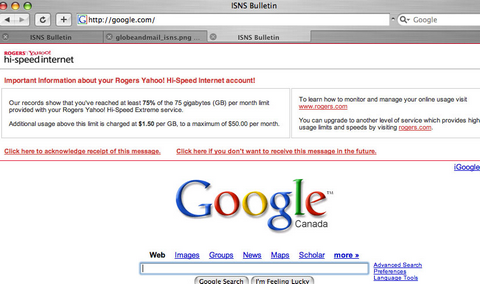Why metered Internet is a really bad idea

The above image from Lauren Weinstein's blog shows why metered Internet is a really bad idea and obnoxious. It shows Canadian ISP Rogers Internet altering web pages to warn you when you go over 75% of your 75GB cap. I checked on the Rogers website for the Toronto Ontario area and 1 mbps service was $33 CAD (worth more than US dollars these days) per month with a 60 GB monthly cap. That effectively means you can only use BitTorrent for about 6 days out of the month. Compared to the Australian plans which have 8GB noon to midnight caps that the EFF was touting as the "better" alternative to Comcast BitTorrent seed throttling, Rogers seems like a pretty good deal. However, it's still nowhere near as good as the US ISPs that don't use metered internet plans.
There are plenty of price tiers in the US that work by limiting the rate at which you can download but not the amount you can download so it's not like everyone is forced to subsidize the big bandwidth users. You can get 768 kbps DSL plans in the US for $15/month which still allow you to theoretically download 248 GBs per month if you kept it running continuously. This offers the best compromise where Internet usage isn't stifled by constant fears of going over the limit or what time of the day it is like your cell phone.
My AT&T DSL plan is 1.5 (good for 1.2 mbps due to distance or line quality) costs $20/month with no metering. I've also had Comcast in the past and they charged less than $40/month with roughly 5 mbps service and they didn't have any gigabyte caps (excluding NNTP news server which doesn't count as network utilization). Comcast doesn't even throttle BitTorrent uploads or downloads, they only limit the number of BitTorrent seed connections you can serve at a time to alleviate the network load. Now is this really that bad of a trade-off to ensure that a few BitTorrent users don't overwhelm the majority of users and make everyone suffer? Even if you throttled BitTorrent upload/downloads by 50% throughput (which isn't being done) and "only" allowed them to download 200 GBs per month instead of 400 GBs per month, is that really so unfair?
On a related note which I also posted as an update, the EFF has responded to me and others that I have misrepresented their position in my blog titled EFF wants to saddle you with metered Internet service. I'll let you be the judge of that so here is what they sent me and what they're telling everyone else.
The article incorrectly states that EFF endorses legislation or regulation that would force ISPs or users to offer only metered services. The EFF report actually states that the *availability* of metered access alongside "all you can eat" plans, combined with accurate advertising by ISPs, is one alternative that might solve whatever congestion issues Comcast might be having (as the language you quote in your article expressly makes clear).
Nowhere in my blog post do I state EFF would force ISPs to *only* offer metered services? All I said was "The EFF goes as far as touting the Australian model for broadband service" as a better alternative to Comcast's current model and I included the Australian ISP link the EFF pointed to. The plans that came up were mostly metered plans and some were very expensive unlimited plans. Peter Eckersley even sent me an email touting this page where you pay $65/month AUD for a plan that gives you 8 GB of "pre-paid data" during noon to midnight [Update 12/12/2007 - Peter Eckersley emailed me saying he sent me the wrong link and had meant to link to this page which is $20 cheaper. That's slightly better but the 8GB cap is still a horrible idea]. Since you can download 8 GBs in less than 2 hours at 10 mbps, you essentially give up using any BitTorrent from noon to midnight unless you want to pay $3/GB. Even the off-peak rates are metered so you still have to be careful to turn off your BitTorrent client after 1 hour each day. If you want 48 GB "pre-paid data", you need to pay $120/month AUD and $3/GB over that amount.
Now consider Comcast's offerings which permit you to download and upload unlimited data using BitTorrent with no throttling for a flat fee of $40 per month. You can easily download 100 GBs and upload 10 GBs per month or more and Comcast won't stop you or charge you anything extra. The only thing Comcast does is occasionally scale back the number of BitTorrent seed connections (dedicated server mode) you can have even though Comcast's TOS (Terms Of Service) prohibits servers of any kind. My ATT DSL plan is less than $20/month and I can download 8 GB per day every day and not pay a single cent on overage charges so what is the EFF thinking recommending the Australian ISP model over Comcast's "bad" model?
The EFF says what Comcast is doing is evil and that the Australian model is the better alternative even though it's draconian compared to what Comcast or any other American ISP is doing. It would certainly stop the BitTorrent usage during peak hours but at what price to the user? The Free Press and Public Knowledge also think metered Internet is a better alternative but they go a step further and want to criminalize Comcast's current operating model and fine them trillions of dollars. So again I ask: Who is the EFF, Free Press, and Public Knowledge serving? The RIAA and MPAA couldn't buy this kind of anti peer-to-peer lobbying if they tried.
